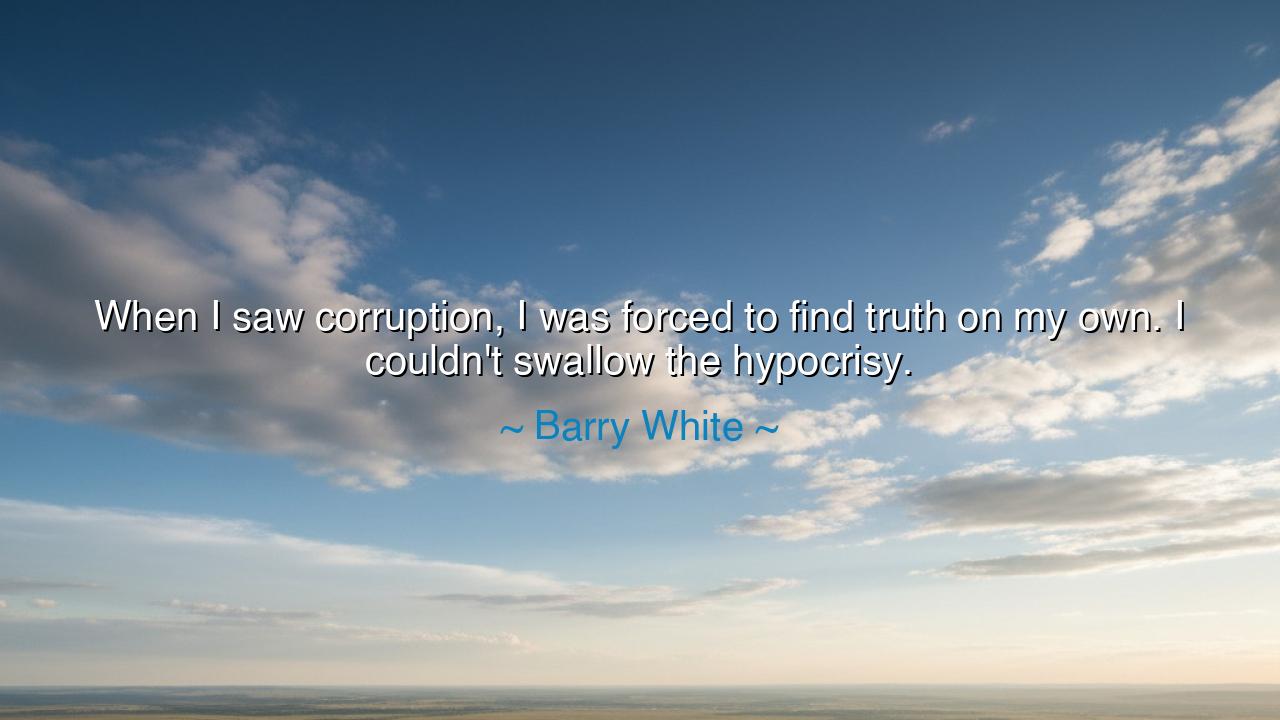
When I saw corruption, I was forced to find truth on my own. I
When I saw corruption, I was forced to find truth on my own. I couldn't swallow the hypocrisy.






Hear the powerful words of Barry White, not merely a singer of songs but a man who wrestled with the contradictions of the world: “When I saw corruption, I was forced to find truth on my own. I couldn't swallow the hypocrisy.” In these words lies the cry of the soul that refuses to bow before falsehood. He speaks of the moment when the veil is torn away, when one sees the corruption of men and systems, and must choose either to accept the lie or to seek the truth by one’s own strength. Barry White chose the harder path—the path of integrity, of independence, of self-discovery.
The ancients knew this struggle well. Many times the youth of noble spirit looked upon their elders and found hypocrisy—priests preaching virtue yet living in vice, rulers proclaiming justice yet ruling with cruelty. For some, this sight led to despair, but for the strong, it became the fire that drove them to seek truth beyond the corruption of their age. It is in this tension, between the betrayal of appearances and the hunger for reality, that wisdom is born.
Consider the life of Martin Luther, who looked upon the church of his time and saw indulgences sold like trinkets, salvation turned into commerce, and piety twisted into power. He could not swallow this hypocrisy. So he sought truth in the Scriptures for himself. His quest set aflame a movement that shook the world, birthing the Reformation. Like Barry White’s confession, his life shows us that when men confront corruption honestly, they may ignite revolutions of the spirit.
History speaks also of Frederick Douglass. Born into slavery, he saw the hypocrisy of a nation that proclaimed liberty while keeping millions in chains. He could not accept it. Forbidden to learn, he taught himself to read and write. Forbidden to speak, he raised his voice until it thundered across the land. He sought truth on his own, and in doing so, he not only freed himself but helped break the shackles of his people. Here too is the lesson: corruption may enslave, but the pursuit of truth liberates.
Why is it that hypocrisy wounds us so deeply? Because it betrays trust. It wears the mask of righteousness while hiding rot beneath. The heart longs for integrity, for harmony between word and deed, promise and action. When that harmony is shattered, we are left with a choice: to accept the lie for the sake of comfort, or to rise and seek truth for ourselves. The weak cling to the mask; the strong tear it away.
The lesson, then, is clear: when you see corruption, do not close your eyes. Do not swallow the poison of hypocrisy. Instead, seek the truth with your whole heart. Question what others accept blindly. Read deeply, listen carefully, and measure every word and action against the eternal standards of justice, love, and integrity. If you must walk alone in your search, walk boldly, for better solitude with truth than fellowship with lies.
So let this wisdom be carved upon your soul: the world will always offer corruption, and men will cloak their vices in holy words. But you are not bound to accept it. Like Barry White, like Luther, like Douglass, you can choose to find truth on your own. Stand against hypocrisy, even when it costs you. For in that stand lies freedom, authenticity, and the power to change not only your life, but the lives of generations to come.






TAtrang anh
I really resonate with Barry White’s words here. The idea of being forced to find the truth on one’s own because of corruption is powerful. It makes me wonder—how do we maintain our integrity when the system around us is deeply flawed? Are we capable of finding truth in a world that seems to be built on lies, or do we risk losing our sense of self by constantly challenging the status quo?
DDeucrisbdodvdodvsjidb
Barry White’s quote reveals a deep dissatisfaction with the world’s hypocrisy, which can be very relatable. Sometimes it’s hard to reconcile what we’re told with what we know to be true. When we’re surrounded by corruption, how do we protect ourselves from becoming numb to it? Is it better to accept the hypocrisy and move on, or should we, like Barry White, take it upon ourselves to seek out the truth even when it’s difficult?
BTBao Tran
This quote makes me think about how easy it is to get trapped in a cycle of accepting corruption or hypocrisy as normal. Barry White’s decision to seek truth on his own shows a strong sense of integrity, but is it always possible to go against the grain? How do we deal with the discomfort that comes with rejecting societal norms and uncovering uncomfortable truths? Can we trust our own judgments when everyone around us seems to be blind to the truth?
Dduong
Barry White’s quote speaks to the personal struggle of confronting corruption and hypocrisy. It’s powerful how he takes responsibility for finding truth on his own, despite the overwhelming forces of dishonesty around him. How often do we feel pressured to accept things at face value, even when something feels wrong? Is it possible to break free from the system and seek truth independently, or do we always need others to validate our conclusions?